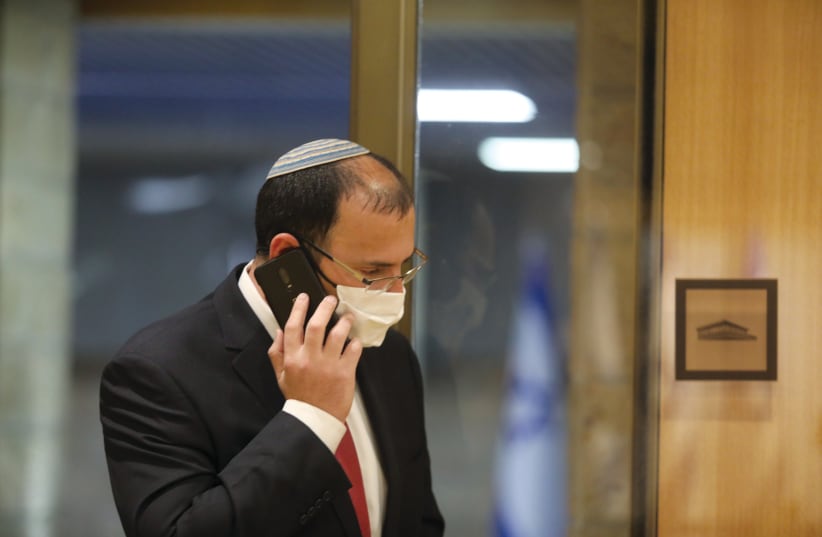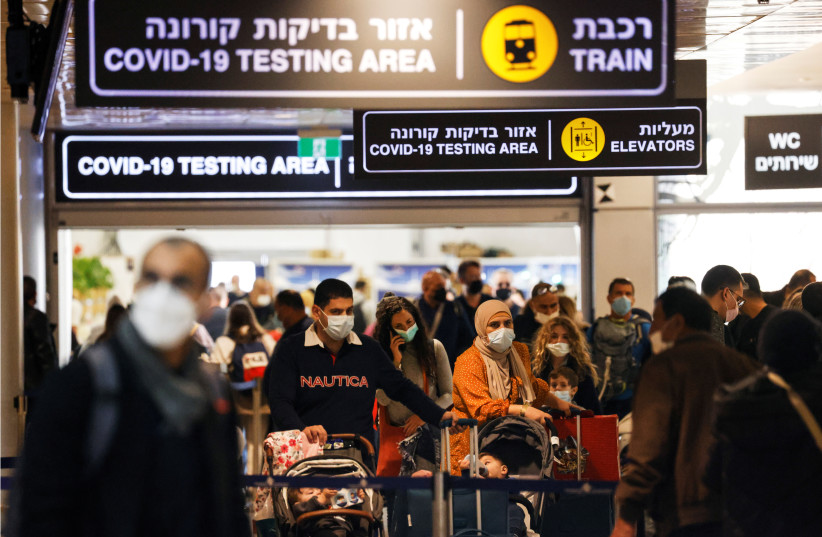Should the Jewish state give preference to Diaspora Jews to enter Israel during the closure Prime Minister Naftali Bennett initiated in an effort to keep out the Omicron variant?
Some may think so but would be afraid to say so out loud. Not Religious Zionist Party MK Simcha Rothman.
In an interview with The Jerusalem Post, Rothman says Israel must open up immediately to those eligible to move to Israel under the Law of Return.
“There is no connection to racism,” Rothman said. “Israel is the home of the Jewish people. You can’t leave people out of their home.”
Rothman cited the Jewish Nation-State Law, in which Israel committed itself to “preserve ties with the Diaspora.” He said the current policy of keeping Diaspora Jews out of Israel violates the law.
Asked about influential Christian Evangelical leaders who are just as supportive of Israel, like Pastor John Hagee, Rothman said “John Hagee will accept it if I say Israel is the home of the Jewish people.”
He noted that, all along, Israel has been letting in key diplomatic delegations from around the world.
“They let in Abu Mazen [Palestinian Authority President Mahmoud Abbas],” he said. “I don’t know if he took a corona test.”
Rothman also supports opening Israel to all first-degree relatives of Israelis, Arabs included.
But Rothman, who has many family members in English-speaking countries, sees his mandate as representing Diaspora Jews in the Knesset. He views himself as the successor of former MKs Dov Lipman and Michal Cotler-Wunsh, who focused on the Diaspora as MKs and continue to help Diaspora Jews in their current roles.
In every meeting of the Knesset Law Committee, he makes a point of speaking about the problems faced by people trying to get into Israel, as well as those who cannot leave the country. A special meeting of the committee will be held Sunday that could change Israel’s policies for entering.
Even though the power of opposition MKs is limited, committee chairman Gilad Kariv (Labor) regularly takes Rothman’s suggestions verbatim and adds them into the law. For instance, Rothman has succeeded in helping change government policies, including enabling people whose main workplace is abroad and whose first-degree relative has a life-cycle event in their family to leave the country.
But that will not be happening with Rothman’s idea of first letting in Diaspora Jews.
“It is not right to separate between Jews and non-Jews,” Kariv’s Labor colleague, Diaspora Affairs Minister Nachman Shai said. “The situation is complicated enough without deciding to enable entrance to Israel on the sole basis of qualifying for the right of return.
“My ministry’s team and I have been working around the clock in recent days to bring about a framework for conditions for entering Israel for those who have a proven connection to the country. There are thousands of people whose center of life is in Israel, have first-degree family or entry permits to Israel.
“Every day, families, individuals, youth groups and community leaders turn to me. I hope there will be a uniform solution soon.”
Foreign Minister Yair Lapid also criticized Rothman’s idea in an answer to a question from the Post at a Yesh Atid faction meeting.
“The reason Israelis are allowed to come in is that it is possible to track them,” Lapid said. “We can track their phones, and we know where they live. This is not true of Jews who live abroad. It has nothing to do with Jews or gentiles. That was why we let in citizens.”
Rothman responded that forbidding people from entering has nothing to do with the ability to track them. He noted that when there was no legal permission for tracking people, foreigners have been allowed in, and that Palestinians infiltrate Israel every day through breaches in the security barrier and are not monitored in any way.
“Israel can handle Diaspora Jews and is obligated to,” he said.
Rothman believes Israel is not doing nearly enough to encourage ideological aliyah from the West. He said Israel must do much more to facilitate the aliyah and absorption of Western olim, instead of investing massive amounts to help immigrants from the former Soviet Union and Ethiopia whose Jewish lineage is questionable or nonexistent.
POLITICALLY, ROTHMAN also tries to draft English-speaking immigrants to his party, which is currently conducting a membership drive. He thinks he can succeed in wooing English-speaking immigrants who regret voting for Bennett’s rival Yamina Party.
“Many Anglos voted for Bennett because they saw him as their representative, because of his background,” Rothman said. “I think many of them are frustrated with what was done with their vote and feel there is nothing for them to do about it to express their frustration until the next election.
“Joining us will not only promote candidates on our list who know how to talk to them and care about their issues. It could also make Yamina MKs realize their people are no longer with them.”
Rothman said he believes if there are a large number of new members from English-speaking communities like Ra’anana, Modi’in and the Neveh Aliza neighborhood of Ginot Shomron, where his wife was raised (by immigrants from Skokie, Illinois), it would send a message to Yamina MKs and possibly even get them to leave the coalition and bring down the government.
“When the illusion is broken, they will come,” he said.
MEANWHILE, ROTHMAN is one of the opposition’s most effective spokesmen and a strong advocate for its policy of not cooperating with the coalition in the Knesset.
“They are wrong that they cooperate too much,” he said. “If it was up to me, I’d be even less cooperative. The behavior of the coalition MKs shames our democracy and themselves, and it will take years to repair the damage.”
Rothman has tried to cooperate with Interior Minister Ayelet Shaked on the controversial citizenship and immigration bills, which would prevent Palestinians from marrying Israeli-Arabs to obtain citizenship and residency in Israel. But both have been stalled for months because they lack a majority as long as the standoff between the coalition and opposition continues.
“Unfortunately, Ayelet hasn’t been able to deliver,” he said. “I’m not under pressure. I put solutions on the table to solve the problem. But she hasn’t been able to pass her own bill in the cabinet, not just the Knesset. I’ve told her, ‘Whenever you need me, you have my number. But bring cash, not a check.’”
Where Rothman and Shaked do cooperate is on the right flank of the Judicial Selection Committee, which will be choosing four new Supreme Court judges in the months ahead. Justice Minister Gideon Sa’ar extended the process this week by enabling new candidates to be considered.
It is now questionable whether replacements for judges who will retire in April will be chosen in time, because of how long the process takes. Rothman is determined to ensure the judges selected will be as conservative as possible.
“The question is what direction you are taking the court,” he said. “They need to go in a conservative direction, and there is no reason to make unnecessary compromises.”
It is possible that Sa’ar will make a deal with other members of the committee and leave out Rothman, the representative of the opposition. But Sa’ar would not be able to prevent Rothman’s criticism from the Right.
“If Sa’ar chooses to ignore me, of course I’m powerless on the committee, but not in the public,” he said.
Rothman is an ally of Sa’ar when it comes to their goal of splitting the role of the attorney-general. But while Sa’ar may compromise and leave the attorney-general in charge of tricky national security indictment law issues, Rothman favors a complete split, as well as creating an independent body that would have the power to indict the prime minister and other ministers.
Just like when it comes to who enters the country, Rothman does not mince words when he speaks his mind.
“We don’t want someone unelected to have such power,” he said. “I don’t believe in doing half the work. A partial solution would just cause more problems.”

